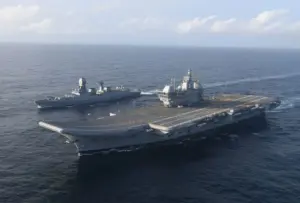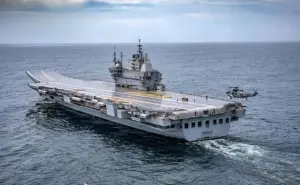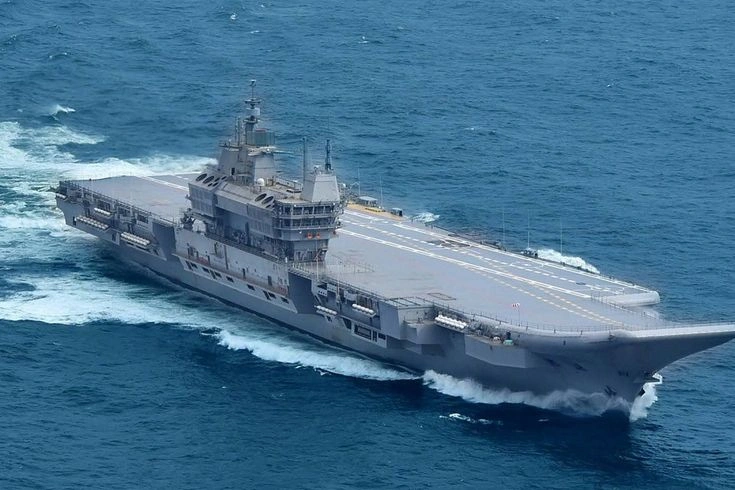🚢 General Overview
INS Vikrant is India’s first indigenous aircraft carrier, symbolizing a leap in India’s maritime capabilities. Commissioned in 2022, it embodies India’s growing naval power and indigenization drive, designed to enhance its naval presence and provide strategic defense capabilities. As a formidable platform for air operations, INS Vikrant offers a versatile and advanced military asset, enabling India to project power across the Indian Ocean region.
Table: General Overview
| Attribute | Details |
|---|---|
| Type | Aircraft Carrier |
| Commissioning Date | 2022 |
| Class | Vikrant Class |
| Country | India |
| Shipyard | Cochin Shipyard Limited |
🛠️ Design and Development
The INS Vikrant’s design and development marked a milestone in India’s defense manufacturing. The project was launched in 2009, with its construction taking place at Cochin Shipyard Limited. Vikrant is designed for multi-role operations, including air defense, surveillance, and offensive strikes. The carrier represents India’s capabilities in designing complex warships and achieving self-reliance in defense technology.
Table: Design and Development
| Attribute | Details |
|---|---|
| Shipyard | Cochin Shipyard Limited |
| Design Launch Year | 2009 |
| Construction Start | 2013 |
| Cost | INR 20,000 Crore |
| Length | 262 meters |

🔧 Technical Specifications
INS Vikrant’s technical specifications include cutting-edge systems and technology for efficient air operations and defense. The ship features a STOBAR (Short Take-Off But Arrested Recovery) configuration, equipped with advanced radar and weapons systems. It boasts a range of 15,000 nautical miles and a maximum speed of 28 knots, making it an exceptional asset for long-duration naval missions.
Table: Technical Specifications
| Attribute | Details |
|---|---|
| Length | 262 meters |
| Width | 62 meters |
| Displacement | 40,000 tons |
| Speed | 28 knots |
| Range | 15,000 nautical miles |
Read More : Pinaka Missile
✈️ Aircraft and Weapons
INS Vikrant is designed to operate a wide array of aircraft and weapons systems. It can accommodate fighter jets like the MiG-29K, as well as helicopters for surveillance and search-and-rescue missions. The ship is equipped with modern weapons systems, including surface-to-air missiles, anti-ship missiles, and advanced radar systems, ensuring superior defense and offensive capabilities.
Table: Aircraft and Weapons
| Attribute | Details |
|---|---|
| Aircraft | MiG-29K, Kamov Ka-31, MH-60R |
| Weapons | Surface-to-air missiles, Anti-ship missiles |
| Radars | 3D air and surface search radar |
| CIWS | Close-In Weapon System (AK-630) |
| Airstrip Capacity | 30+ aircraft |
🇮🇳 Strategic Significance
INS Vikrant plays a pivotal role in strengthening India’s maritime defense strategy, particularly in the Indian Ocean Region. Its ability to operate a wide array of aircraft enables rapid deployment, deterrence, and power projection. The aircraft carrier supports India’s maritime dominance, allowing for better response times to regional threats, enhancing national security, and promoting strategic partnerships with other maritime nations.
Table: Strategic Significance
| Attribute | Details |
|---|---|
| Role | Power projection, Maritime security |
| Operational Range | Indian Ocean and surrounding regions |
| Impact | Strengthens India’s naval deterrence |
| Strategic Partners | Regional alliances and global presence |
| Deterrence Capability | High, with air and naval assets |
📜 Historical Context
The first INS Vikrant was commissioned in 1961 and served until 1997, playing a crucial role in India’s naval operations, especially during the 1971 Indo-Pakistan War. The legacy of the first Vikrant paved the way for the second, a more advanced and capable aircraft carrier that integrates indigenous technology. The new Vikrant continues India’s commitment to strengthening its naval capabilities and national defense.
Table: Historical Context
| Attribute | Details |
|---|---|
| First Vikrant Commissioned | 1961 |
| Service Duration | 1961–1997 |
| Second Vikrant Commissioned | 2022 |
| Historical Importance | Key role in 1971 Indo-Pak war |
| Legacy | Foundation for modern naval capability |
MSRP of INS Vikrant
The INS Vikrant, which was commissioned at an estimated cost of INR 20,000 Crore, represents one of India’s most ambitious and costly defense projects. This price includes its construction, advanced systems integration, and long-term operational costs.
Table: MSRP of INS Vikrant
| Attribute | Details |
|---|---|
| MSRP | INR 20,000 Crore |
| Currency | Indian Rupees |
| Involved Costs | Design, construction, integration |
| Operational Costs | Long-term maintenance and upgrades |
| Funding Source | Indian government defense budget |
INS Vikrant Length
INS Vikrant measures 262 meters in length, making it one of the largest warships in India’s fleet. This extensive length allows it to carry a large complement of aircraft and provide ample space for crew, weapons systems, and essential mission equipment.
Table: INS Vikrant Length
| Attribute | Details |
|---|---|
| Length | 262 meters |
| Beam | 62 meters |
| Height | 59 meters |
| Flight Deck Length | 252 meters |
INS Vikrant Maximum Speed
INS Vikrant has a maximum speed of 28 knots, allowing it to rapidly deploy and maneuver across vast distances. This speed ensures quick response times to emerging threats, providing operational flexibility and effectiveness in defense missions.
Table: INS Vikrant Maximum Speed
| Attribute | Details |
|---|---|
| Max Speed | 28 knots |
| Cruising Speed | 18-20 knots |
| Acceleration | Rapid, for swift response operations |
| Speed Importance | Essential for naval maneuverability |
What is INS Vikrant?
INS Vikrant is an advanced, indigenous aircraft carrier that strengthens India’s defense capabilities and maritime presence. It is designed for multi-role operations, providing India with enhanced power projection, deterrence, and a long-range air defense platform.
Read More : Voronezh Radar
Table: What is INS Vikrant?
| Attribute | Details |
|---|---|
| Type | Indigenous Aircraft Carrier |
| Commissioned | 2022 |
| Primary Function | Naval defense, power projection |
| Aircraft Capacity | 30+ aircraft |
| Technological Features | STOBAR configuration, advanced radar systems |
How Many INS Vikrant India Have?
India currently has one INS Vikrant, which was commissioned in 2022. It is India’s first indigenous aircraft carrier, although the legacy of the name Vikrant dates back to its predecessor, which served from 1961 to 1997.
Table: How Many INS Vikrant India Have?
| Attribute | Details |
|---|---|
| Current Ships | 1 (INS Vikrant) |
| Historical Ships | 2 (First INS Vikrant and current one) |
| Class | Vikrant Class |
| Future Plans | Expansion of aircraft carrier fleet |

INS Vikrant Museum
INS Vikrant, after its decommissioning, is being transformed into a maritime museum. Located in Mumbai, it offers visitors a chance to explore India’s naval history and the technological marvels of the aircraft carrier, showcasing exhibits, aircraft, and historical artifacts.
Table: INS Vikrant Museum
| Attribute | Details |
|---|---|
| Location | Mumbai, Maharashtra |
| Type | Maritime Museum |
| Opening Year | 2022 (as a museum) |
| Key Features | Aircraft displays, naval history exhibits |
Conclusion
INS Vikrant is a game-changer in India’s naval defense capabilities, showcasing India’s indigenization efforts and technological advancements. It enhances India’s strategic reach and strengthens its position in the Indian Ocean Region. With cutting-edge technology and strategic significance, INS Vikrant is poised to play a crucial role in shaping India’s maritime security for years to come.
Key Facts at a Glance
| Attribute | Details |
|---|---|
| Name | Vikrant |
| Namesake | Vikrant (1961) |
| Operator | Indian Navy |
| Ordered | 2004 |
| Builder | Cochin Shipyard Limited |
| Cost | ₹23,000 crore (equivalent to ₹260 billion or US$3.1 billion in 2023) |
| Laid down | 28 February 2009 |
| Launched | 12 August 2013 |
| Acquired | 28 July 2022 |
| Commissioned | 2 September 2022 |
| Homeport | INS Kadamba, Karwar |
| Identification | Pennant number: R11 |
| Motto | जयेम सं युधिस्पृधः (Sanskrit) – “I defeat those who fight against me” |
| Nickname(s) | IAC-1 |
| Status | In active service |
| Badge |
(Image not provided) |
General Characteristics
| Attribute | Details |
|---|---|
| Class and Type | Vikrant-class aircraft carrier |
| Displacement | 45,000 tonnes loaded / standard |
| Length | 262.5 m (861 ft) |
| Beam | 62 m (203 ft) |
| Height | 59 m (194 ft) |
| Draught | 8.4 m (28 ft) |
| Depth | 25.6 m (84 ft) |
| Decks | 14 |
| Propulsion | 4 × GE LM2500 Gas Turbines (100 MW), 2 × Elecon COGAG Gearbox |
| Speed | 30 kn (56 km/h; 35 mph) |
| Range | 8,000 nmi (15,000 km; 9,200 mi) |
| Crew | 196 officers, 1,449 sailors (incl. air crew) |
Sensors and Processing Systems
| System | Details |
|---|---|
| Multifunction Radar | Elta EL/M-2248 MF-STAR AESA radar |
| Air Surveillance Radar | Selex RAN-40L 3D L-Band radar |
Electronic Warfare & Decoys
| System | Details |
|---|---|
| EW Suite | DRDO Shakti |
| Anti-Missile System | Kavach |
| Torpedo Defence System | Maareech Advanced Torpedo Defence System |
Armament
| Weapon | Details |
|---|---|
| Surface-to-Air Missiles | 2 × 32-cell VLS Barak 8 SAM (Range: 0.5 km to 100 km) |
| CIWS | 4 × AK-630 |
| Remote-Controlled Guns | 5 × OFT 12.7 mm M2 Stabilized RCG |
Aircraft Carried (Total: 36)
| Type | Aircraft |
|---|---|
| Fixed-wing | Mikoyan MiG-29K, Rafale M (on order), HAL TEDBF (in development) |
| Rotary-wing | Kamov Ka-31, MH-60R, HAL Dhruv |
Aviation Facilities
| Facility | Details |
|---|---|
| Flight Deck | 12,500 m² |
Read More : Barak 8
5 Most Asked FAQs
1. What is the INS Vikrant full form?
The INS Vikrant full form is Indian Naval Ship Vikrant. “INS” stands for Indian Naval Ship, while “Vikrant” is derived from Sanskrit, meaning courageous or victorious. The name reflects India’s naval strength and self-reliance in defense.
2. What is the cost of INS Vikrant?
The total estimated cost of INS Vikrant is INR 20,000 Crore, making it one of India’s most ambitious defense projects.
3. How long is INS Vikrant?
INS Vikrant is 262 meters long, which allows it to host more than 30 aircraft and house a crew of over 1,600 personnel.
4. What types of aircraft does INS Vikrant carry?
It operates MiG-29K fighter jets, MH-60R Seahawks, and Kamov Ka-31 helicopters, enabling multi-role operations.
5. Where is the INS Vikrant museum located?
The decommissioned first INS Vikrant was turned into a museum in Mumbai, but a new museum dedicated to the legacy of both carriers is in planning.
Read Also –
